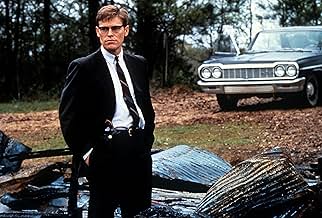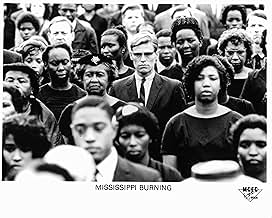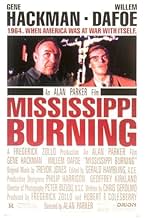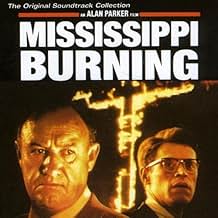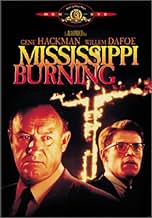Dos agentes del FBI, con estilos muy diferentes, llegan a Mississippi para investigar la desaparición de varios activistas por los derechos civiles.Dos agentes del FBI, con estilos muy diferentes, llegan a Mississippi para investigar la desaparición de varios activistas por los derechos civiles.Dos agentes del FBI, con estilos muy diferentes, llegan a Mississippi para investigar la desaparición de varios activistas por los derechos civiles.
- Ganó 1 premio Óscar
- 17 premios y 25 nominaciones en total
- Judge
- (as Tom Mason)
Resumen
Reseñas destacadas
I didn't want to see this film again because of the awful situations I saw or heard of. Now, I am out on my own, and I had the chance to see the movie once again, and felt that I could see it. It's a terrific and very powerful movie that can get anyone to cry unbearably. It's not just the actors, but Gene and William's characters, I wanted to be just like them, they were able to stand up even though the many times of being knocked down and caring so much just to try to in some way save that town.
I honestly feel that everyone should see this movie, it can change your life or make you look around and want to change things. I know this comment feels more like a lecture than a comment, but that's how much this movie got to me. I think we all can do something right in this world, it's just a matter or standing up. Even if this film isn't historically accurate, it's accurate enough to see how people treat other people. Hopefully, we will have a better future for generations to come.
9/10
Director Alan Parker has been down this road before with Midnight Express, another crushing, gut-wrenching tale based on a true story. In both cases, a great deal of liberty is taken with the facts, but that doesn't matter. Mississippi Burning is not a docudrama or an A & E special, it is at its heart, a police drama, and a near perfect one at that.
It is criticized by some for its depiction of southerners of the time as a group of brain-dead racists with no moral fiber whatsoever. I don't believe that is the movie's intention, but it spends time showing this side of society to make us understand how hate breeds itself, and how it becomes a way of life and an accepted standard. As one character states, "When we were seven years old, they told us that segregation was in the bible. You hear that long enough, you start to believe it".
Mississippi Burning won a (well-deserved) Oscar for cinematography, but sat and watched Rain Main take home the majors. It was clearly the best film of 1988 and stands as one of the great works of American cinema of the 80's. Hackman and Dafoe are at their best, and Frances McDormand delivers a beautifully understated, powerful performance as the deputy's wife - a woman at war with her sense of right and wrong, struggling with fear and loyalty. Her character is the centerpiece of the movie.
This is not a preachy or melodramatic movie. You won't get a lecture on why racism is wrong. You will get an rich, engaging crime drama depicting a pivotal time in American History, and you will never forget it.
**** out of ****.
¿Sabías que...?
- CuriosidadesThe film is inspired by the murder of voting rights activists James Chaney, Michael Schwerner, and Andrew Goodman by the Ku Klux Klan.
- PifiasWhen Anderson throws Pell into the chairs at the barbershop, Pell's stunt double has a different hairstyle (balding, with a comb-over).
- Citas
Ward: Where does it come from? All this hatred?
Anderson: You know, when I was a little boy, there was an old negro farmer that lived down the road from us, name of Monroe. And he was... well, I guess he was just a little luckier than my daddy was. He bought himself a mule. That was a big deal around that town. My daddy hated that mule, 'cause his friends were always kidding him that they saw Monroe out plowing with his new mule, and Monroe was going to rent another field now he had a mule. One morning, that mule showed up dead. They poisoned the water. After that, there wasn't any mention about that mule around my daddy. It just never came up. One time, we were driving down that road, and we passed Monroe's place and we saw it was empty. He just packed up and left, I guess, he must of went up north or something. I looked over at my daddy's face. I knew he done it. He saw that I knew. He was ashamed. I guess he was ashamed. He looked at me and said, If you ain't better than a nigger, son, who are you better than?
Ward: You think that's an excuse?
Anderson: No it's not an excuse. It's just a story about my daddy.
Ward: Where's that leave you?
Anderson: My old man was just so full of hate that he didn't know that bein' poor was what was killing him.
- Banda sonoraTake My Hand Precious Lord
Words and Music by Thomas A. Dorsey
Performed by Mahalia Jackson
Courtesy of CBS Records
Selecciones populares
- How long is Mississippi Burning?Con tecnología de Alexa
- After Anderson goes to the bar where the KKK is hanging out and lays down the law to them, he returns to the headquarters where Ward chews him out for that incident as well as hanging out at the beauty parlor. Anderson tells Ward "Deputy Pell's wife won't give us the info we need because her husband controls what she says and I'm not going to choke it out of her". Ward responds "this can of worms only opens from the inside". What did Ward mean with the "can of worms" comment?
- When Ward told Anderson "this can of worms only opens from the inside" after Anderson told ward he won't get any info out of mrs pell, what did that quote mean?
- How did Sheriff Stuckey know / find out that it was Deputy Pell's wife that blabbed ?
Detalles
Taquilla
- Presupuesto
- 15.000.000 US$ (estimación)
- Recaudación en Estados Unidos y Canadá
- 34.603.943 US$
- Fin de semana de estreno en EE. UU. y Canadá
- 225.034 US$
- 11 dic 1988
- Recaudación en todo el mundo
- 34.603.943 US$
Contribuir a esta página






